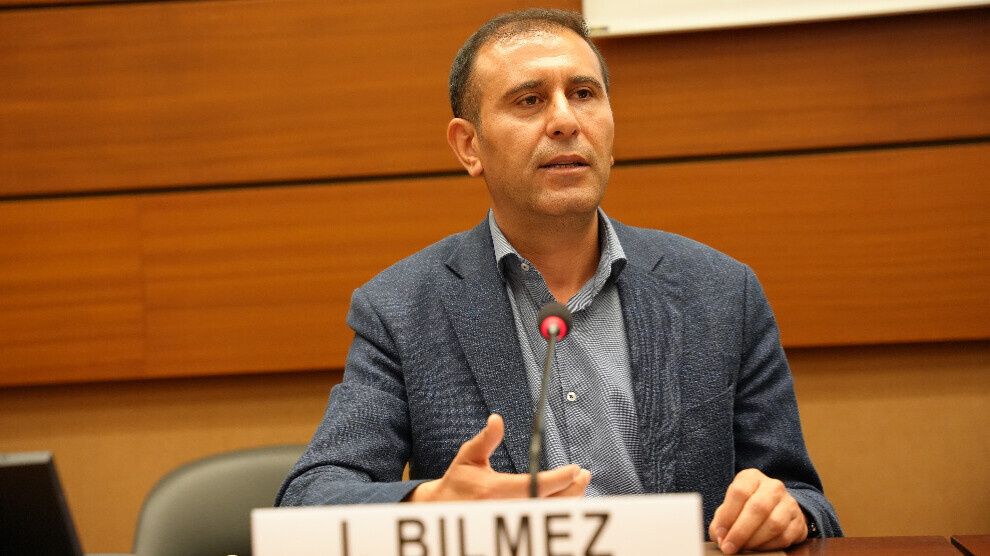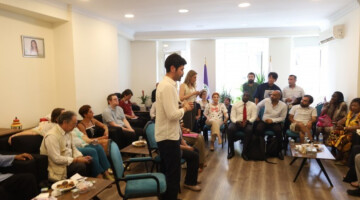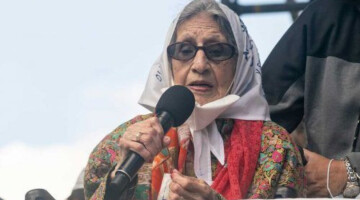There has been no news for 40 months from Kurdish People's Leader Abdullah Öcalan, who has been held in severe isolation conditions in Imrali Prison Island for more than 25 years. Abdullah Öcalan, whose right to visit his family and lawyer has been usurped, is kept in a state of absolute lack of communication. Despite his lawyers’ requests to eliminate this unlawfulness, the European Committee for the Prevention of Torture (CPT), which has the sole authority to enter Imrali, is content with the statement "We are following the issue closely."
ANF talked to Ibrahim Bilmez, one of the lawyers of Kurdish People's Leader Abdullah Öcalan, who attended a conference held at the United Nations Geneva Office and drew attention to the lawlessness in Imrali.
'We are facing an unprecedented situation'
First of all, could you summarize the stage reached in the Imrali isolation system and the legal struggle you are waging against it?
Here we are under the umbrella of the UN. There are hundreds of states that are members of the UN. I started by saying, ‘I will describe a prison and if you know another prison with similar conditions to this one, please tell me at the end of the conference.’ This wasn't just a simple sentence. Indeed, we are faced with an unprecedented situation in Imrali. No legal system would accept such isolation and such an exception. Therefore, this isolation is not acceptable.
Let me put it this way. The prison called Imrali has F Type status under the Ministry of Justice, and even F Type status is unacceptable. The conditions there are of total isolation. Human rights organizations in Turkey have struggled for a long time against this. The conditions in Imrali prison are many times harsher than the conditions in F-Type prisons.
We have not heard from our client, Mr. Abdullah Öcalan, for 40 months. We have not heard anything from Mr. Öcalan since his second phone call on 25 March 2021. That phone call was with his brother an was interrupted after a few minutes. Mr. Öcalan said to his brother, 'I want Turkey to implement its own laws. And I want to meet with my lawyers as soon as possible.’
We haven't heard anything from him since that day. We apply to both the Bursa Chief Public Prosecutor's Office and the Imrali Prison Directorate twice every week to be granted visits for us, the lawyers. We also apply every week on behalf of families. None of these requests are even answered. Thereupon, we apply to the Bursa Execution Judgeship, and when it rejects, we appeal to the High Criminal Court. When the chamber is rejected, we appeal to the Constitutional Court.
We waited for a long time for the Constitutional Court to take action on this issue. Unfortunately, no positive decision comes from there. We have more than 60 pending applications to the Constitutional Court. Unfortunately, the Constitutional Court acts as a barrier instead of fulfilling the requirements of the Constitution and the law.
It keeps our files and applications there. Therefore, the Constitutional Court contributes to this isolation. If the Constitutional Court makes a negative decision, we take it to the ECHR. This is the domestic law part. We are doing everything to overcome the isolation, but we cannot achieve any results.
When the Constitutional Court gives a negative decision, even if we take it to the ECHR, we are faced with a separate problem there. In fact, cases at the ECHR last an average of five or six years. We have to wait.
In 2012, we had Mr. Öcalan and five other clients who were held in Imrali at that time. The reason these five people were brought to Imrali was to end the isolation. Instead, these five people were subjected to the same isolation as Mr. Öcalan. They brought them to Imrali from F Type prisons, but they did not even use their rights in F Type prisons here. Those who went there after them have not been able to meet with their lawyers to date. They cannot meet with their families or benefit from telephone rights. They too fell into isolation in Imrali. We assessed this situation as group isolation. And we made an application to the ECHR for them. This was an application we call mass isolation. The ECHR has not made a decision on this issue since 2012. 12 years have passed, unfortunately, an institution like the ECHR has not yet made a decision. We think that this attitude of the ECHR is political.
'As lawyers, we are excluded from all processes'
They wonder how such isolation and lawlessness can be imposed on people. Here's what they do: They use disciplinary measures to prevent family members from visiting. Every three months, the Imrali Prison Administration Monitoring Board automatically imposes disciplinary punishment on Mr. Öcalan and our three clients there. They prohibit meeting with the family for three months. And this is how they explain the reason for the ban on visits.
We never learn the reason for these disciplinary punishments. As lawyers, we are also excluded from these processes. Despite all the applications we have made, neither the decisions containing disciplinary punishment are sent to us, nor are we given the file upon our objection, nor are we allowed to examine the file. We are not notified of anything. As lawyers, we are completely excluded from the judicial mechanism.
Bursa Execution Judgeship is responsible for lawyer meetings. This institution prohibits meetings with lawyers. It automatically issues a ban decision every 6 months. And the reason for these prohibition decisions is hidden from us. We are not included in this process. We also object to this and take it to the ECHR. This is the legal aspect of the matter.
What I am telling you has no place in any legal system. It is not possible to implement the lawyer ban in this way. This means eliminating the essence of the right to defence. Constantly banning lawyers and disciplinary punishments and banning family visits is torture. This situation was also expressed in previous reports of the CPT.
'We are at the worst point'
You said it before: One of the biggest factors in the deepening of the Imrali isolation is the attitude of the CPT. The CPT, which last visited Imrali in September 2022, has still not announced its report. You ask the CPT to visit Imrali again. In the face of all this, the CPT still remains silent. How should we evaluate the CPT's attitude?
I do not think that the CPT's stance contributes to ending isolation in Imrali. The CPT has been involved from the beginning. Since Mr. Öcalan was handed over to Turkey through a conspiracy and this system in Imrali was built, the CPT has been involved with this system in some way.
To date, he has visited Imrali 9 times, published the reports of 8 visits, and criticized Turkey in all of these reports, saying that the conditions in Imrali were unacceptable and that there was a very heavy isolation. In fact, the CPT itself used the term incommunicado in its last report.
However, Turkey did not fulfill any of the criticisms made in the CPT's reports. And today we are at the worst point. We haven't heard from our client for 40 months. There is no lawyer or family visit. There is no response to the letters we wrote. There is no communication. We can actually only assume that our clients are in Imrali.
As lawyers, we are not even in a position to confirm this. We are not in a position to confirm their health. Therefore, if there is such a situation and the CPT has been involved in the process from the formation of this system until today, we cannot say that the CPT has no responsibility. It does have responsibility.
'Imrali is not an ordinary prison'
The CPT has not yet announced the report of its last visit to Imrali. Yes, it is true, Turkey's consent is required for the CPT to share its report with the public. But we reached a point in which there has been a very severe isolation for 25 years, and no news for 40 months. Imrali is not an ordinary prison. There is an unusual situation. There is a very extraordinary situation. Mr. Öcalan's advanced age and health problems are in question. Our other three clients have been in prison and in harsh conditions for almost 30 years. Therefore, CPT cannot approach Imrali as an ordinary prison. If Turkey does not allow the disclosure of this report, it is time for the CPT to implement the requirements of Article 10/2 of its own procedure.
'The CPT must make a statement to the public now'
Within the scope of this article, the CPT can make a statement about the country that does not allow the disclosure of that report or about the countries that have not implemented the corrections recommended by the CPT in that report for many years. It makes a statement to the international public and declares that the country does not comply with the law and the European Convention and violates it. No country that has the rule of law written in its constitution would want to be faced with this statement. But Turkey is slowly moving to this point. In our opinion, the CPT should now make this statement. It's about time, because it can't get any worse than this.
'The CPT should do whatever is necessary'
I met with people who visited Imrali, such as former CPT presidents Mauro Palma, Marc Neve and Jean-Pierre Restellini. These people said that the CPT could be more active and that the CPT could resort to the public statement you mentioned in the face of Turkey's attitude. So why does the CPT refrain from making this statement?
In fact, this question should be asked to CPT officials. We express these demands and thoughts in our meetings with CPT officials. But they prefer to remain silent. They just say the same thing to us every time; 'We are following the process. We are in communication with Turkey. This isolation is unacceptable for us as well.’ they say.’ They don't say anything else. Unfortunately, they do not do what they say they should.
The CPT has internal balances; they may be thinking about them or they are afraid of the reaction Turkey might show. But as I said, we cannot experience a worse situation than the situation we are experiencing today in terms of the Imrali isolation. That's why the CPT must do whatever is necessary now.
'Imrali's position is against the law'
When we look at the reports of CPT officials who first visited Imrali, they point out that it is not suitable for a prison as a location. CPT officials who attended these visits stated that they had serious discussions on this issue with Turkish officials at that time. At this stage, we see that the CPT is staying away from expressing this situation. On what basis are your applications to the ECHR? Do you have any applications stating that your right to defense has been violated due to the location of Imrali?
These arguments are already present in all the applications we make. It is against the law for a prison to be isolated like this, on an isolated island. It is not an accessible place. It has been declared as a completely military area. Imrali normally has F Type status. There are many prisons in the country, with F Type status. Lawyers can go to these prisons and meet with their clients. But Imrali was placed on an island and declared a military zone. We were only taken there by state-owned ship under the supervision of the gendarmerie. So there is no way to reach it. There is no way to get information from there.
This is the situation we are experiencing right now. Four people are imprisoned on an island and have not been heard from for 40 months. Therefore, the conditions are unacceptable. But we have come to a very bad point. Yes, the island conditions were not suitable for Mr. Öcalan's health condition. But today we have come to such a point that we cannot even hear from our clients. The CPT needs to take action as soon as possible. They should ensure that we go and hear from our clients. They also need to go to Imrali again as soon as possible. It is not enough for them to simply approve the statement of Turkey's latest report. Because it's been two years since that happened. They need to go again.














